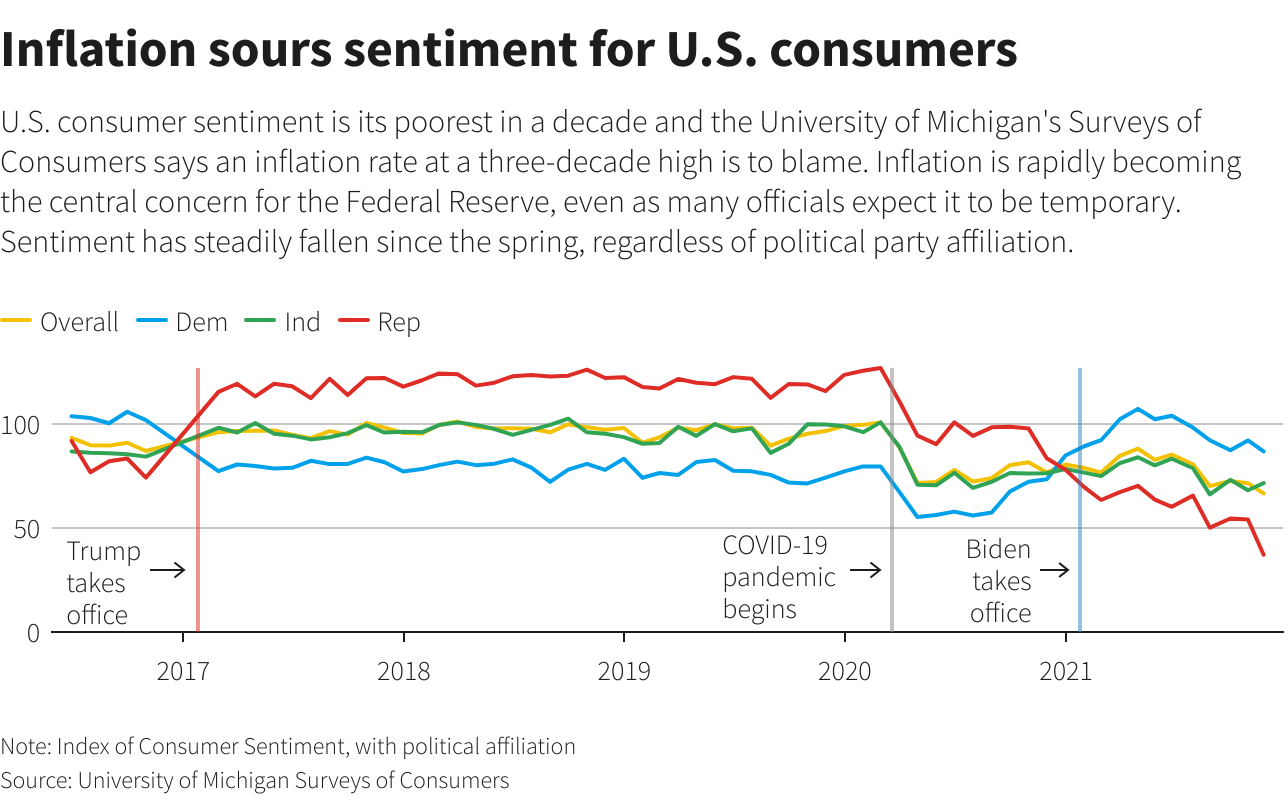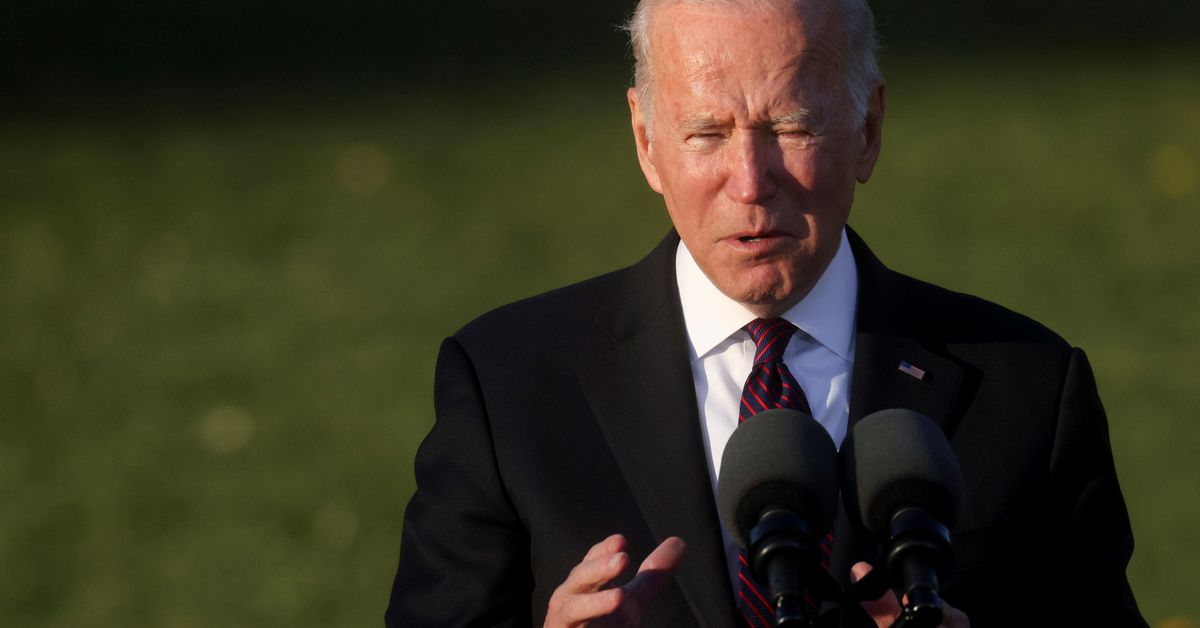U.S. President Joe Biden speaks during a ceremony to sign the “Infrastructure Investment and Jobs Act”, on the South Lawn at the White House in Washington, U.S., November 15, 2021. REUTERS/Leah Millis
WASHINGTON, Nov 17 (Reuters) – U.S. President Joe Biden’s nominee as the next chair of the Federal Reserve, expected as soon as this week, will inherit an economy headed for the fastest annual growth in a generation with wage increases flowing to the lowest-paid workers, strong hiring, and household bank accounts flush with cash.
They’ll also inherit a situation where homes, cars, food, and clothing are becoming steadily more expensive, and whether it’s current chair Jerome Powell for a second four-year term or a promotion for current Fed Governor Lael Brainard, dealing with that inflation shock carries risks for both the president, the economy and the Fed.
Rising prices have already begun to sour the public mood, pushing Biden’s approval numbers to the lowest point of his presidency, cited in polls as a concern that crosses party lines and income brackets and which is shared even among those for whom higher prices have been offset by ongoing government payments.
For the Fed, it has presented an old problem in fresh circumstances – with tangled global supply chains, a hard-to-read and potentially diminished U.S. labor market, and rising prices potentially forcing them to raise interest rates and slow growth before the economy recovers the jobs and workforce levels seen before the coronavirus crisis.
It’s a choice both Biden and the Fed hoped could be avoided in a drive to push job growth further and deeper into the economy, on the expectation inflation would behave roughly the same as it did before the pandemic. It hasn’t.
“Six percent inflation is not the right level of inflation, we can all agree on that,” said Nela Richardson, chief economist for payroll processor ADP, citing recent consumer price increases, at a 30-year high, that have wiped out rising wages and far outstripped the Fed’s 2% target.
The Fed still expects that high pace of price increases to be “transitory,” but “wealthier consumers have the luxury of time,” Richardson said. “Low-income less-skilled consumers do not. As much as I understand the transitory argument, waiting it out is not the best option for some people.”

‘A LOT OF CONTINUITY’
Biden said Tuesday he would make a decision on the Fed in around four days. Powell’s current term ends in February and whether Biden chooses him or Brainard – both have been interviewed – the nominee will need to go through a confirmation hearing and vote in a closely divided Senate.
But a process that began as a somewhat clear-cut choice – stick with the Republican Powell for continuity and bipartisanship or tap the Democrat Brainard to reward supporters and pursue a broader remake of the central bank – has turned trickier.
Both are practiced central bankers who have worked together for years and shared in remaking Fed policy to put more emphasis on jobs and allow some higher inflation to do so. Both will have to wrestle in coming months with the same dilemma of how far to let those inflation risks run before taking action.
“No matter how this comes out there would be a lot of continuity in Fed policy. Both of these players have long track records,” St. Louis Federal Reserve President James Bullard said Tuesday on Bloomberg Television.
But politically the landscape for Biden has changed from one where the Fed could keep its prime focus on jobs to one where the fortunes of the president and his party may need a dose of inflation fighting as well.
INFLATION A ‘VERY BIG CONCERN’
Objectively much is going right. The economy added more than half a million jobs in October and analysts expect strong employment growth ahead given the near-record number of openings reported by firms and the willingness to offer higher wages.
Households are still sitting on large cash balances as a result of pandemic stimulus programs – and are willing to spend based on retail sales that continued strong in October. Families with children are receiving monthly payments that have cut poverty rates and should, ostensibly, ease the sting of higher food and gas prices. read more
Yet Biden seems to have gotten little or no credit for that. In a recent Reuters/Ipsos poll inflation was cited by strong majorities of Democrats and Republicans as a “very big concern for me,” an opinion that did not vary by much across education levels, income or among parents, many of whom receive the monthly child tax credits.
Republicans have zeroed in on the issue as a potent one for next year’s midterm elections, and some Democratic lawmakers and economists as well have called on the Fed for tougher action.
The Biden administration, like many at the central bank, also believes the current run of inflation is a temporary byproduct of ramping up the global economy after the pandemic.
But a Biden adviser said fears about inflation and the economy in general were the main reason for Biden’s decline in the polls in recent months – and that it was incumbent on Democrats to show they understand the issue and are trying to solve it.
How that plays into the Fed choice remains unclear.
Brainard, at the margin, may be the more “dovish” choice, willing to show more patience in raising rates. Still, she’s also a Phd economist schooled in the downside of letting inflation spiral and unlikely to let it happen on her watch.
Powell, a private equity lawyer but convert to the strategy of pushing broad employment gains, may have an easier road to confirmation, with announced support already among Senate Republicans and Democrats.
The president himself has begun putting inflation more center stage.
“Many people remain unsettled about the economy, and we all know why,” Biden said last week. “They see higher prices. They go to the store…or go online and they can’t find what they always want and when they want it. We’re tracking these issues and trying to figure out how to tackle them head on.”
Reporting by Howard Schneider;
Additional reporting by Trevor Hunnicutt; Editing by Andrea Ricci
Our Standards: The Thomson Reuters Trust Principles.





